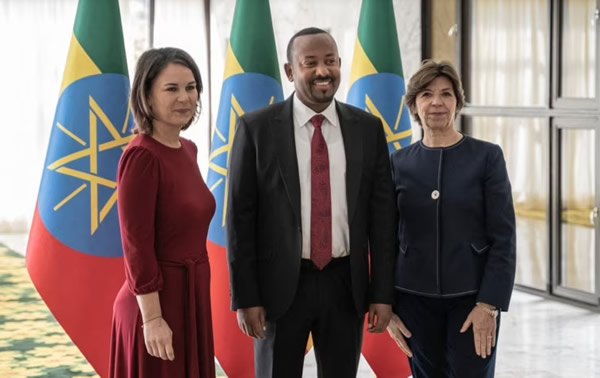
The foreign ministers of Germany and France have arrived in Ethiopia to support a November peace deal between federal and Tigray authorities to end two years of brutal war.
Annalena Baerbock and Catherine Colonna met Thursday with Prime Minister Abiy Ahmed as part of their diplomatic outreach.
The November deal has seen steady progress with basic services restored to the Tigray region, increased aid, and a first handover of heavy weapons by the Tigray People’s Liberation Front to Ethiopia’s federal forces.
Witnesses say Eritrean troops in December withdrew from at least two cities in Tigray but it’s not yet clear if they intend to leave the region entirely.
The European leaders will also meet with officials at the Addis Ababa-headquartered African Union.
The AU brokered the Tigray peace deal and its monitors arrived in the region this month to oversee its implementation.
Germany and France also want to help with food insecurity caused by a record drought in the Horn of Africa and a squeeze on grain supplies and increased food prices resulting from Russia’s war on Ukraine.
The ministers’ two-day visit includes a trip to a World Food Program warehouse in Ethiopia’s Oromia Region, where donated wheat from Ukraine to help address the hunger is being stored.
The German and French governments financed delivery of the much-needed grain and are expected to announce fresh aid to people in areas that have been most affected by Ethiopia’s civil war.
Baerbock said her visit was intended to support Ethiopia on its way to “lasting peace and accountability for human rights abuses.”
U.N. investigators say there is evidence of war crimes and crimes against humanity committed by all sides in the conflict, including rapes, torture, and extra-judicial killings.
A U.N. report in September said the Ethiopian government and its allies also used starvation as a weapon of war, which it denies.
Researchers at Ghent University in Belgium estimate that between 385,000 and 600,000 civilians died in Ethiopia since war broke out in November 2020 from conflict, hunger, disease, and lack of medical care.
The U.N. says millions were displaced in the war and more than five million Tigrayans need humanitarian aid.
Source: voanews.com























